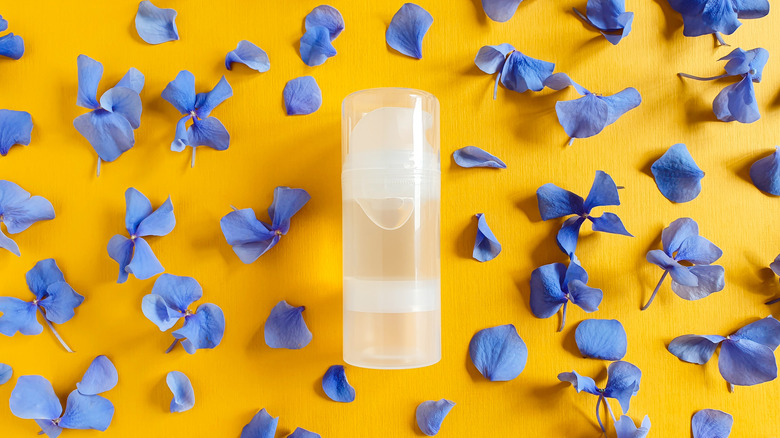What Happens If Lube Makes Your Skin Irritated
Sometimes, you need a little help with lubrication down there when you're getting intimate with your partner, like when you're experiencing vaginal dryness from smoking, certain medications, menopause, or certain underlying health conditions. Even when these aren't factors, sex therapists recommend proper lubrication for a more pleasurable experience for both you and your partner. Plus, using lube is one of the ways in which you can avoid feeling sore after sex.
But there are times when applying lube can go horribly wrong, like when your skin is irritated by it. And while there are quite a few surprising things that happen to your body during sex, this one has a more simple explanation. Skin irritation on contact with lube can mean you're experiencing an allergic reaction to one or many of the ingredients in the product, according to OB/GYN and book author Dr. Alyssa Dweck, per PopSugar. You could experience itchiness, a rash or hives, a burning sensation, discharge, difficulty breathing, and swelling in your tongue, throat, and face. The latter symptoms mean things are serious and that you should make a trip to the emergency room.
Lube can cause yeast infections too
Certain ingredients in lube are known to cause yeast infections in some people, especially if you have sensitive skin. Examples include glycerin, nonoxynol-9, propylene glycol, chlorhexidine gluconate, and petroleum-based products.
According to Dr. Jamil Abdur-Rahman, a board-certified OB/GYN and chairman of obstetrics and gynecology at Vista East Medical Center in Waukegan, Illinois, "Glycerin is a metabolic byproduct of sugar, which can serve as food source for microbes" (via SELF). Nonoxynol-9 can mess with the pH balance in your vagina, propylene glycol could affect someone with skin sensitivities, chlorhexidine gluconate could cause burning and irritation, and petroleum-based products could alter the pH in your vagina, leading to infection.
You may have to engage in some detective work if you notice a yeast infection or skin irritation right after using lube and see if any of the ingredients in the product could be the culprit. Trying out different brands to see what happens with each of them is one way to go, but there are some expert-recommended tips on understanding lube and choosing the right one for you.
Choosing a lube that works for you
Skin sensitivities are very subjective. That being said, it's important to understand how lubes are broadly categorized (water-based, silicone-based, and oil-based) and how one might suit you better than the other, depending on how your skin reacts after sexual intercourse. Water-based ones are generally okay for sensitive skin (and won't stain your sheets), but they're not long-lasting. Silicone-based lubes last longer but take longer to wash off. Oil-based lubricants, while long-lasting, could mess with vaginal pH balance.
Choosing a lube that has a few ingredients (that you understand) is a good bet. That way, you'll know what you're applying to your skin. And if you're thinking going "natural" or "organic" can give you 100% protection from skin irritations, think again. While they may be paraben-free, this doesn't mean all the natural ingredients in them won't cause an allergic reaction on your skin. Steering clear of products with fragrances or the terms "cooling" or "tingling" is also wise, per gynecologist Dr. Talia Crawford (via Cleveland Clinic). If the idea of using lube alternatives (e.g., shampoos, lotions, honey, syrup, or synthetic oils) is floating in your mind, these come with risks, too. Cleansing products and sugary substances can mess with your pH balance (and get sticky and irritating), while lotions and synthetic oils can irritate your skin.



